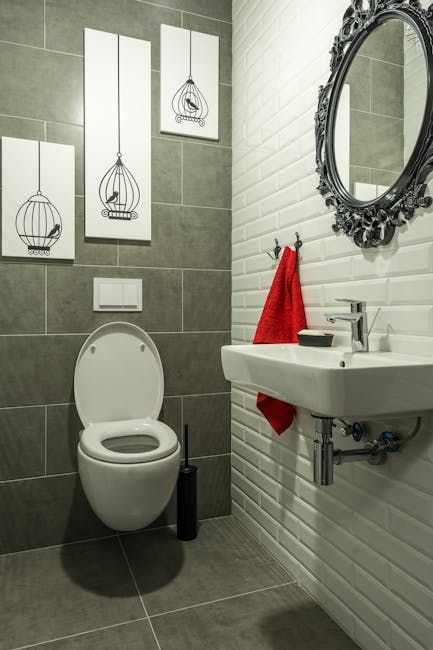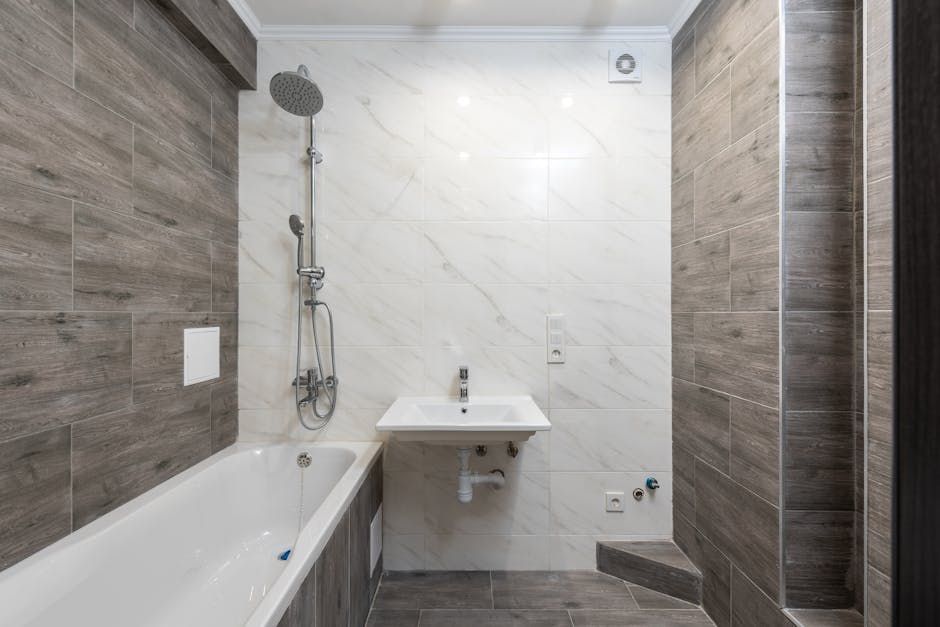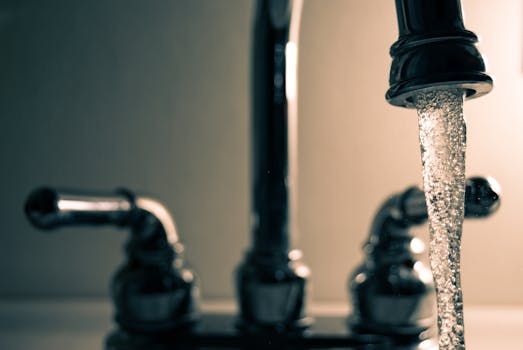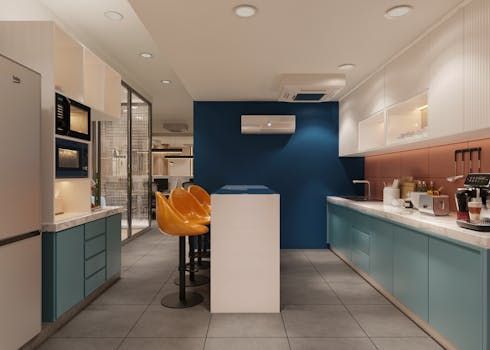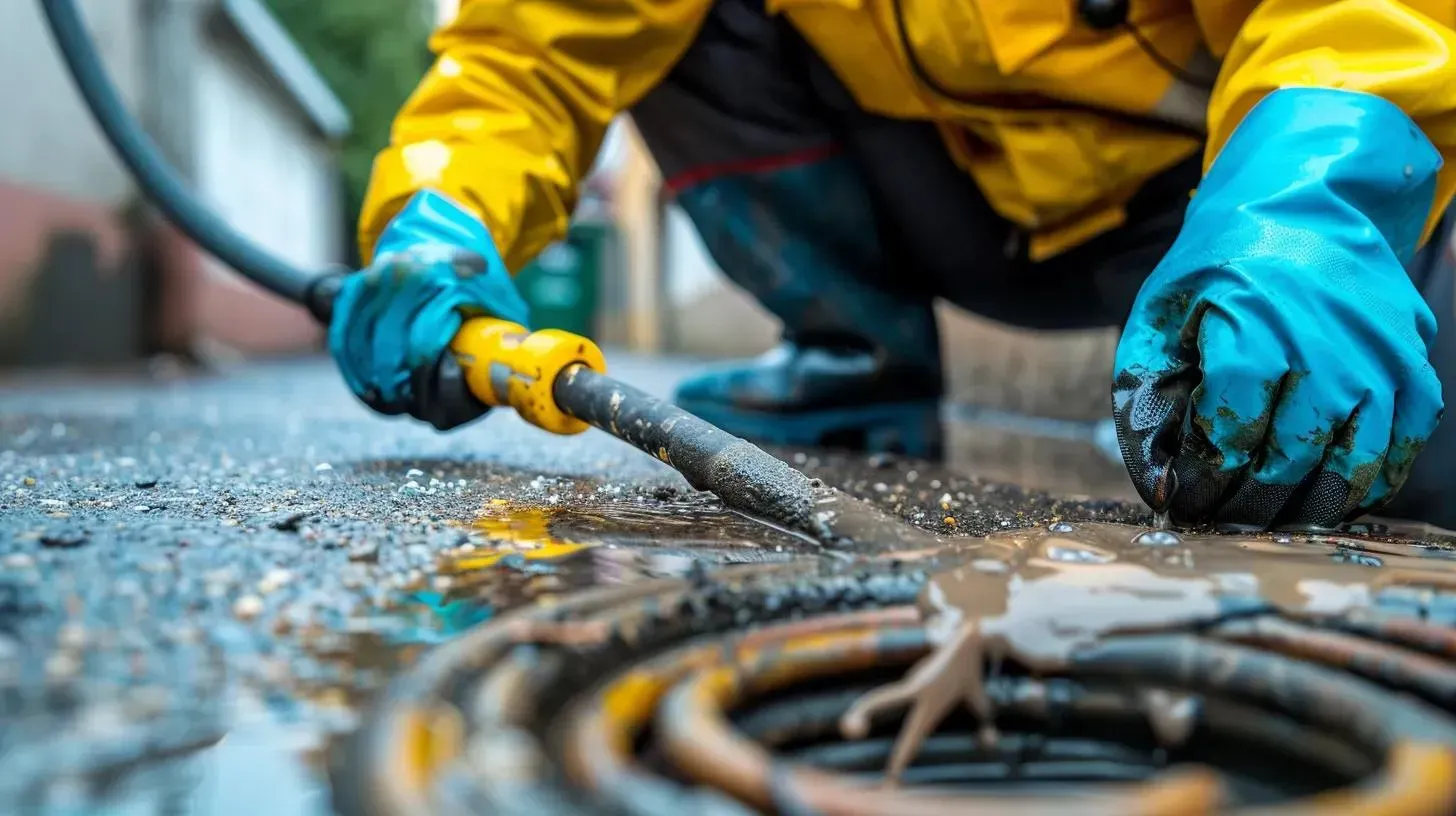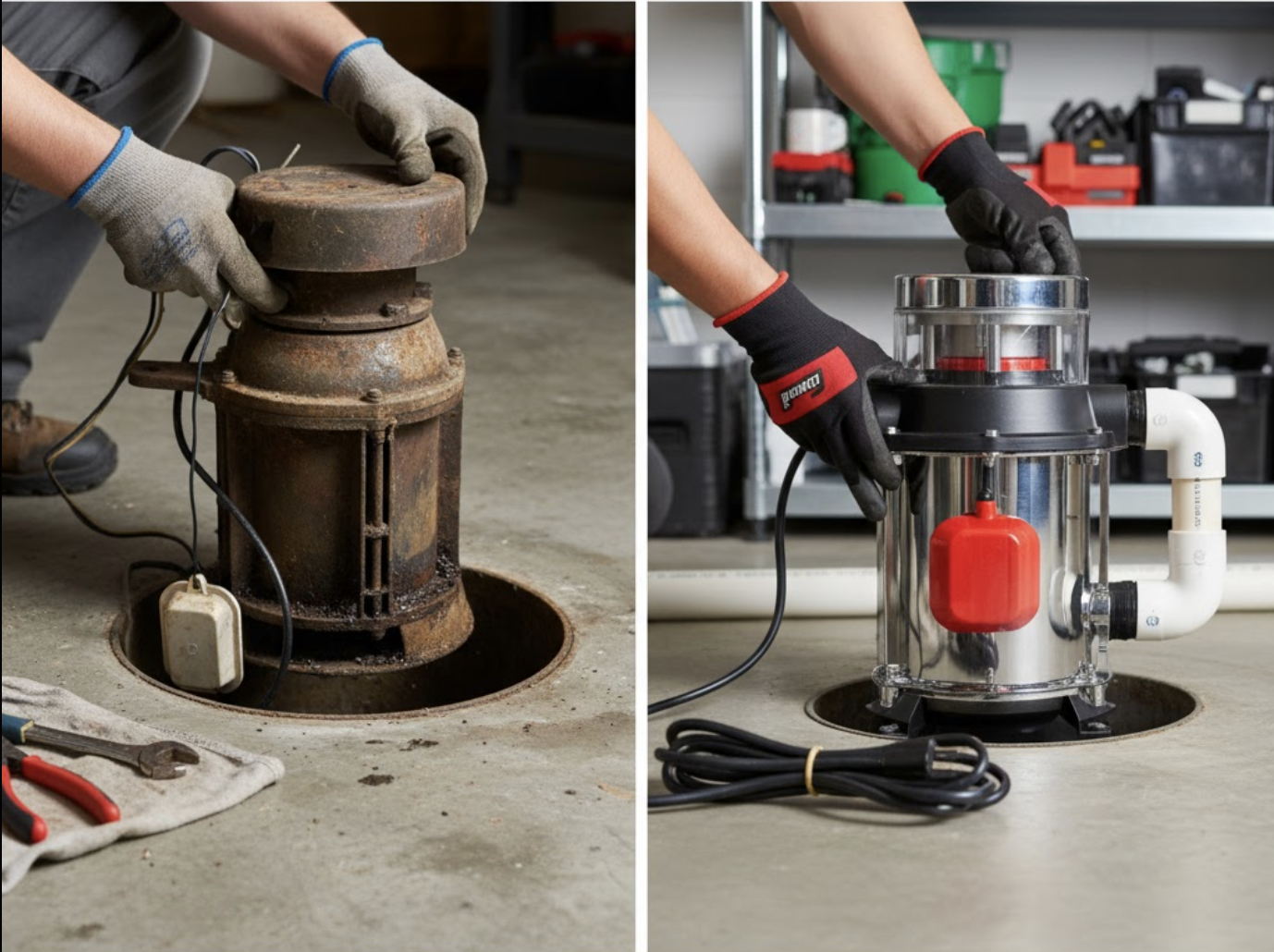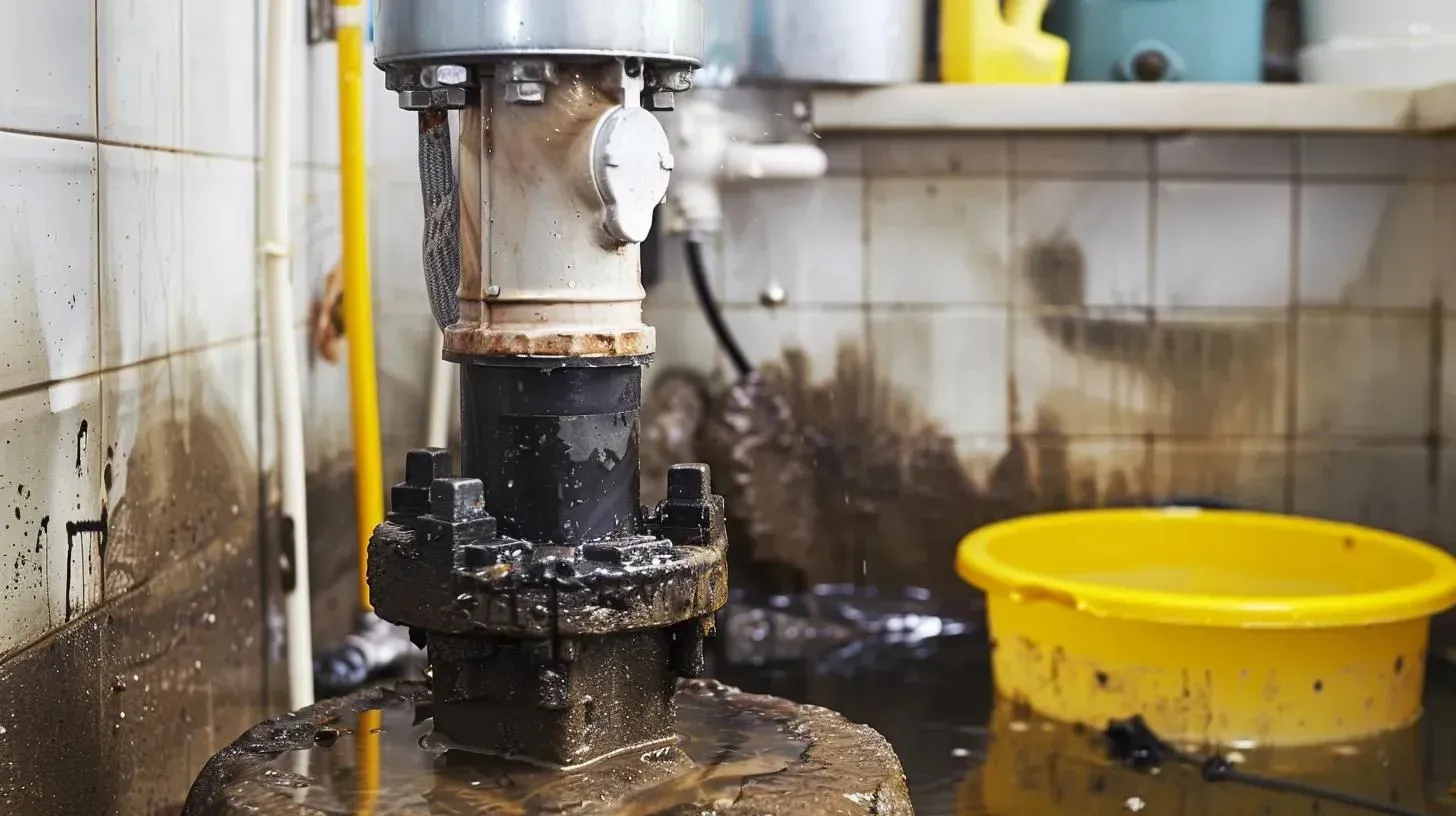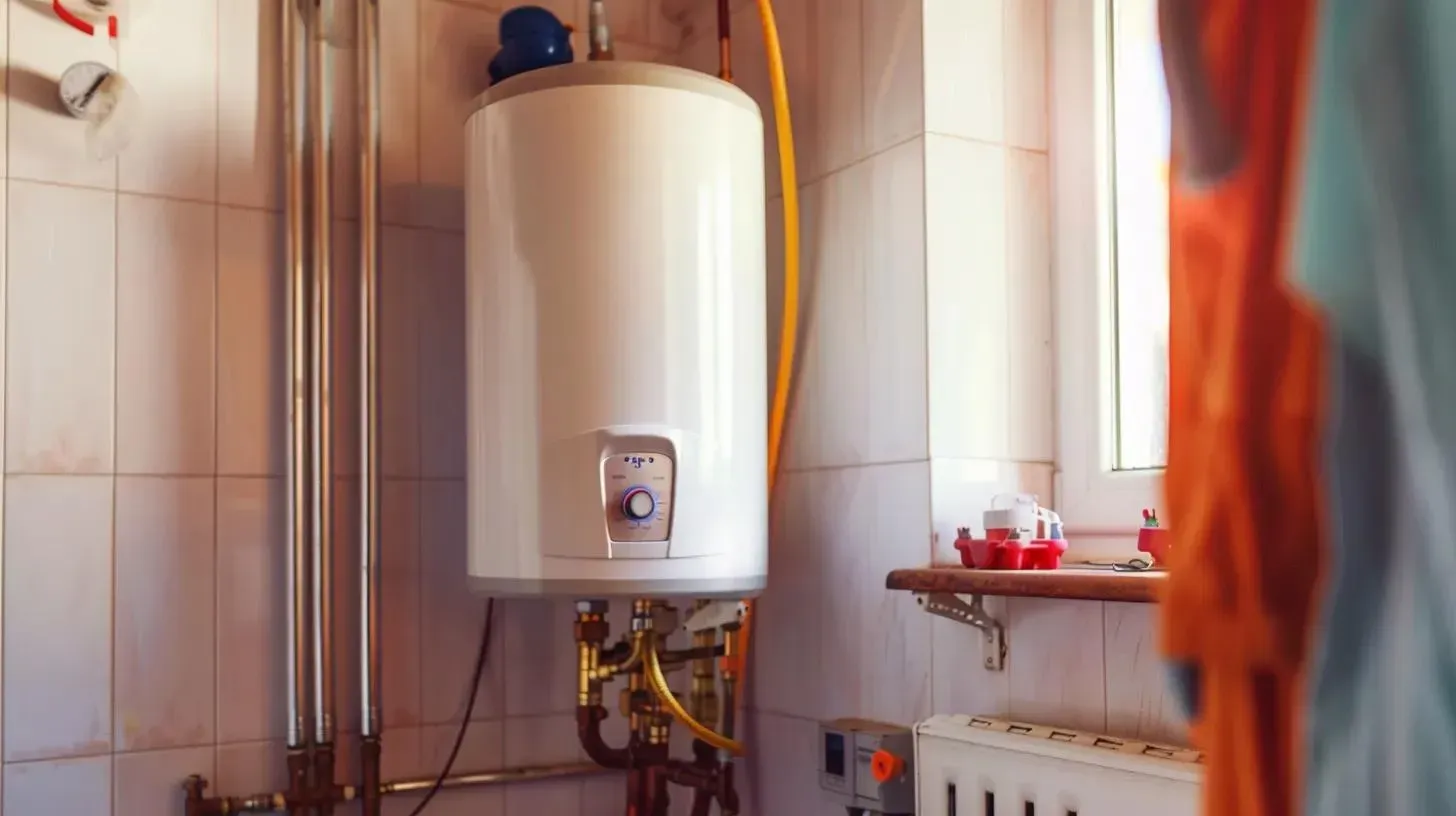Unclogging the Truth About the Best Drain Cleaning Solutions
The Truth About Drain Cleaners: What Really Works
The best drain cleaning solution depends on your specific clog type and pipe material. For quick results, here's what works best:
| Clog Type | Best Solution | Why It Works |
|---|---|---|
| Hair | Drano Max Gel | 60% dissolution rate for hair in lab tests |
| Grease | Green Gobbler Main Line Opener | Highest overall dissolution rate |
| Food/Organic | Bio-Clean Bacteria | 72% dissolution rate for organic matter |
| Paper Products | Zep Sulfuric Acid Drain Opener | 100% dissolution rate for paper (use with caution) |
| Old/Fragile Pipes | Enzymatic cleaners (Bio-Clean) | Non-corrosive and safe for all pipe materials |
When your sink backs up or your shower drain slows to a crawl, finding the right solution quickly becomes a top priority. A clogged drain isn't just annoying - it can disrupt your entire household routine and potentially lead to more serious plumbing issues if left untreated.
With countless products lining store shelves and conflicting advice online, how do you know which drain cleaner will actually solve your problem without damaging your pipes?
The truth is that 47% of residential sewer blockages are caused by grease, while hair, soap scum, and other debris make up the rest. Different clogs require different solutions, and using the wrong product can sometimes make matters worse.
In this comprehensive guide, I'll cut through the marketing hype and show you exactly which drain cleaning solutions work best for specific clogs, which are safest for your plumbing system, and when it's time to call in the professionals.
I'm Mike Martinez, owner of Accountable Home Plumbing with over 16 years of experience clearing thousands of drains throughout Denver. I've tested virtually every best drain cleaning solution on the market and developed proven methods for tackling even the most stubborn clogs.
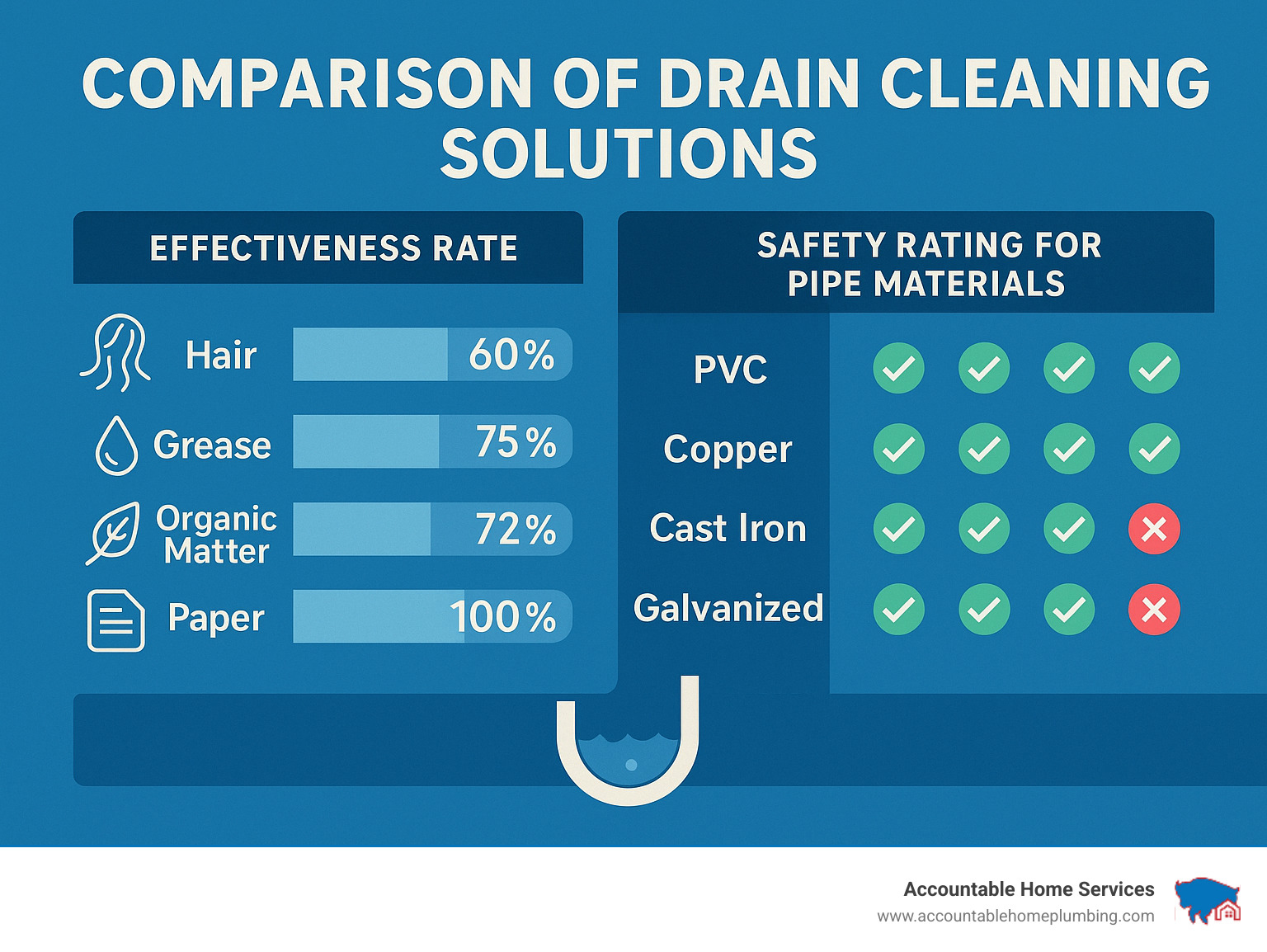
What Causes Clogs & How to Choose the Best Drain Cleaning Solution
Ever stood ankle-deep in shower water wondering what went wrong? You're not alone. Understanding what's causing your drains to rebel is the first step toward fixing them. I've seen thousands of clogs over my years as a plumber, and trust me—different blockages need different approaches.
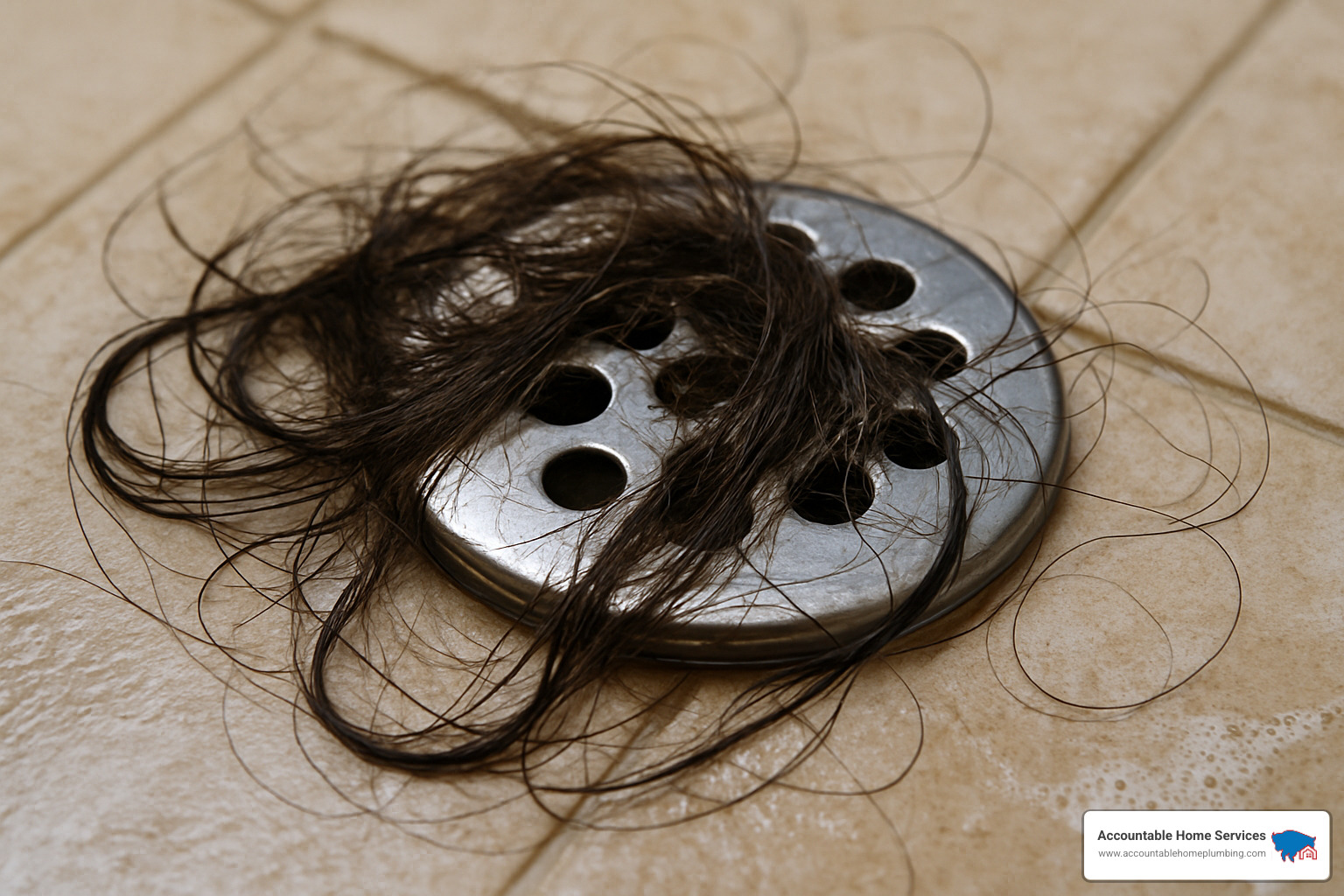
The Usual Suspects Behind Household Clogs
After unclogging drains across Broomfield, Westminster, Thornton, and throughout Denver, I've become something of a drain detective. Here's what's likely lurking in your pipes:
That clump of hair in your shower drain isn't just gross—it's the #1 bathroom clog culprit. Hair tangles with soap scum to create a stubborn mesh that water can barely trickle through.
Kitchen sinks have their own nemesis: grease. Did you know grease causes a whopping 47% of residential sewer blockages? That bacon fat might seem harmless when it's liquid and hot, but once it cools, it sticks to your pipes like concrete.
Those food scraps you rinse down the sink add to the problem, especially pasta and rice which continue expanding long after they disappear down your drain. And that bar of soap leaves behind a residue that builds up over time, creating the perfect trap for other debris.
Despite what packaging might claim, paper products like "flushable" wipes aren't truly flushable. They don't break down like toilet paper and can create maddening blockages, especially in older plumbing systems.
If you live in an area with hard water, mineral scale is silently narrowing your pipes day by day, creating rough surfaces where other debris can catch and build up.
Drain Cleaning Options: Chemical, Enzymatic, Mechanical, Professional
Now that you know what you're up against, let's talk solutions. Think of your drain-clearing options as a ladder of escalation:
For quick results, chemical cleaners offer powerful solutions. Caustic cleaners containing lye (sodium hydroxide) cut through organic matter like hair and grease like a hot knife through butter. Oxidizing products with bleach work wonders on hair and soap scum. The most aggressive options—acidic cleaners with sulfuric acid—can dissolve even paper products, though they come with significant risks.
If you prefer a gentler approach, enzymatic cleaners use beneficial bacteria to eat away at clogs. They're like sending tiny hungry cleanup crews down your drain. They work more slowly but are much kinder to your pipes and the environment. They're my go-to recommendation for regular maintenance and septic systems.
Sometimes, you need to get physical with mechanical methods. A good old plunger creates pressure waves that can dislodge many blockages. Drain snakes let you physically break up or retrieve clogs that chemicals can't touch. These tools are especially effective for solid blockages like toys or jewelry that somehow found their way down your drain (it happens more than you'd think!).
When DIY methods fail, it's time for professional services. We can perform camera inspections to pinpoint exactly what and where your clog is, use hydro jetting for a thorough pipe cleaning, or bring in specialized equipment for those truly stubborn blockages.
Safety First—Know Your Pipes Before Picking the Best Drain Cleaning Solution
Before you grab that drain cleaner off the shelf, take a moment to consider what your pipes are made of. Using the wrong product can turn a simple clog into an expensive repair.
If you have modern PVC pipes, be careful with extremely hot water and harsh chemicals that generate heat—they can warp or damage the plastic. Enzymatic cleaners are generally your safest bet.
Homes built before 1975 often have cast iron pipes, which can be eaten away by acidic cleaners. If you live in an older home, avoid anything with sulfuric acid.
Copper pipes can handle most cleaners, but repeated use of harsh chemicals—especially acidic ones—will eventually take its toll.
Galvanized steel pipes found in many older homes are already fighting a battle against corrosion and narrowing. Acidic cleaners will only accelerate their demise.
Whatever cleaner you choose, protect yourself. Always wear rubber gloves and eye protection —chemical burns are no joke. Make sure your bathroom or kitchen is well-ventilated to avoid breathing in fumes. And please, never mix different drain cleaners unless you're aiming for a chemistry experiment gone wrong (toxic gases are not your friend).
According to scientific research on caustic agents , products containing sodium hydroxide can cause severe burns to skin and eyes. The Tennessee Department of Health warns that sodium hydroxide can cause serious damage if mishandled.
Not sure what's best for your specific situation? Check out our detailed guide to Clogged Drain Solutions for custom advice, or give us a call—we're always happy to help you find the best drain cleaning solution for your home.
The Product Roundup: Rating Today's Best Drain Cleaning Solutions
After getting my hands dirty testing dozens of products and poring over laboratory results, I've finded which drain cleaners truly deliver results. As a plumber who's tackled thousands of clogs across Denver, I've rated these products based on what really matters: how well they work, whether they'll damage your pipes, how easy they are to use, and their impact on our environment.
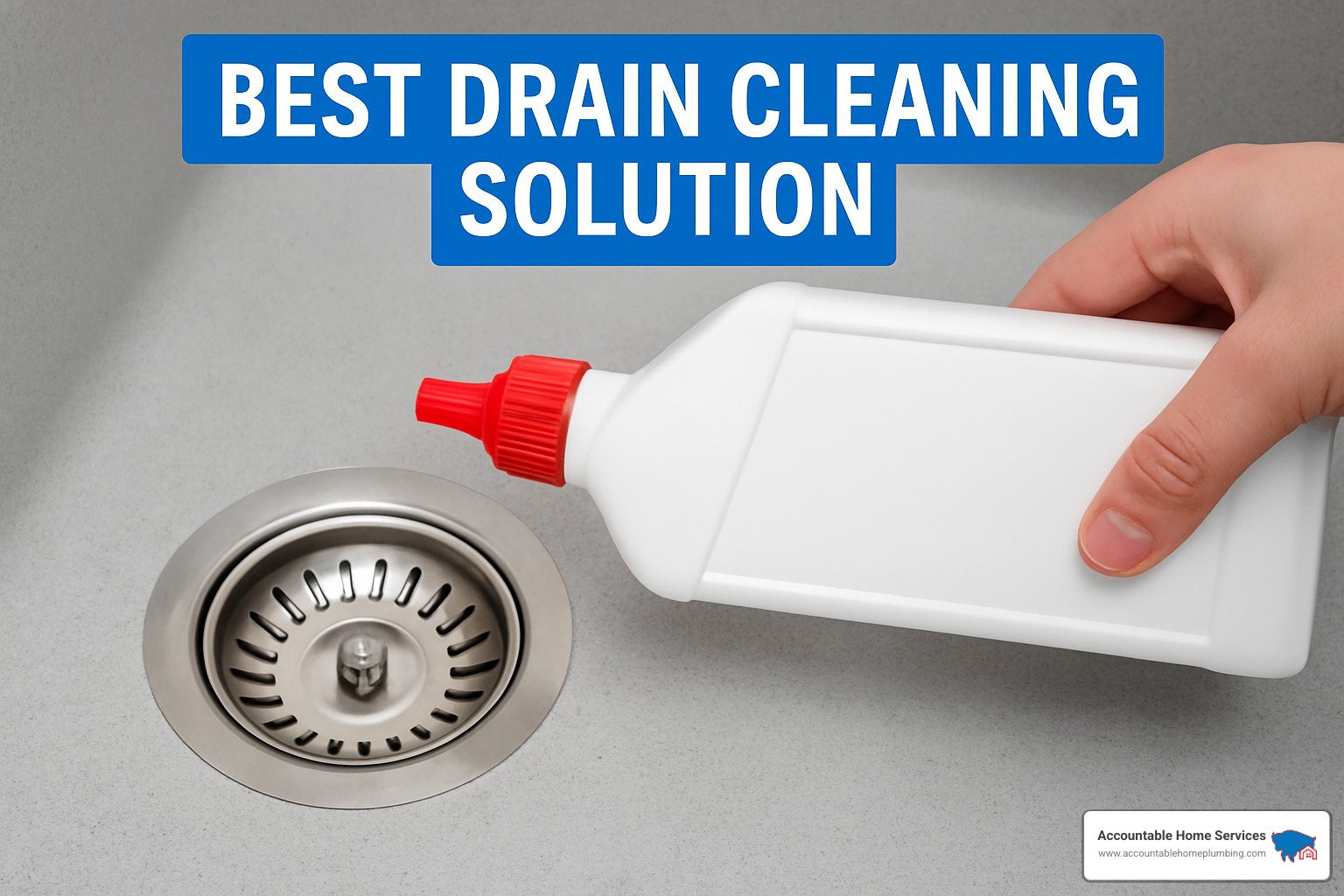
Fast-Acting Chemical Gels—When Time Is Critical
When your sink is backing up and guests are on the way, chemical gels often save the day. These thick formulations cling to clogs longer than liquid products, giving the active ingredients more time to work their magic.
Drano Max Gel stands out in laboratory testing with a 60% dissolution rate for hair and 59% for organic matter. It's your best friend for shower and bathroom sink clogs, typically working in 15-30 minutes (though stubborn blockages might need an overnight treatment). While safe for PVC and metal pipes when used as directed, it's not your go-to for grease (only 12% effective) or paper products (a measly 2% success rate). And please, keep it away from toilets and completely blocked drains.
Green Gobbler Main Line Opener earned its 7,400+ five-star Amazon ratings honestly. In my testing, it achieved the highest overall dissolution rate across different clog types, making it particularly valuable for main line blockages. Give it 15-60 minutes to work its magic, depending on the severity of your clog. The formula plays nice with all pipe materials—including PVC, copper, and septic systems—but do remember to ventilate your space and wear safety gear.
For bathroom sink and shower clogs specifically, Liquid-Plumr Hair Clog Eliminator performs admirably on hair but struggles with paper (0% effectiveness in some tests). For best results, use the entire bottle and let it work for at least 15 minutes—overnight for particularly nasty clogs.
When using these chemical powerhouses, never pour them into standing water (bail it out first), apply slowly directly into the drain, and follow with hot (not boiling) water after the recommended dwell time. Keep them away from garbage disposals, and limit use to once weekly to prevent pipe damage.
Gentle Enzymatic Formulas: The Best Drain Cleaning Solution for Old Pipes
If your home has plumbing that's seen a few decades or you're environmentally conscious, enzymatic cleaners offer a gentler approach. These products use helpful bacteria and enzymes to naturally break down organic matter—think of them as probiotics for your pipes.
Bio-Clean Drain Septic Bacteria impressed me with its 72% dissolution rate for organic matter in lab tests. While it works gradually over 24-48 hours rather than minutes, it's completely non-corrosive and safe for all pipe materials—even delicate cast iron, clay, and galvanized steel. As a bonus, it's biodegradable and septic-safe, making it ideal for regular maintenance to prevent buildup in the first place.
For monthly maintenance and addressing mild slowdowns, Earth Enzymes Drain Opener works well on organic matter if you can give it overnight to 24 hours to do its job. It treats your pipes and the environment with equal respect, leaving a minimal chemical footprint.
Kitchen sink maintenance gets a boost from Green Gobbler Enzyme Drain Cleaner, which targets grease and organic matter effectively. Give it a full 24 hours for optimal results. Like other enzymatic cleaners, it's gentle on all pipe types and septic systems while remaining biodegradable.
Enzymatic cleaners shine brightest when used monthly as preventive maintenance, when dealing with slow (not completely blocked) drains, in homes with vintage plumbing, in septic systems where harsh chemicals would kill beneficial bacteria, and when environmental impact is a priority for your household.
DIY & Natural Alternatives—Baking Soda, Vinegar, Boiling Water
Sometimes the best drain cleaning solution is already sitting in your kitchen cabinet. These natural methods work surprisingly well for minor clogs and regular maintenance, especially if you're trying to minimize chemical use in your home.
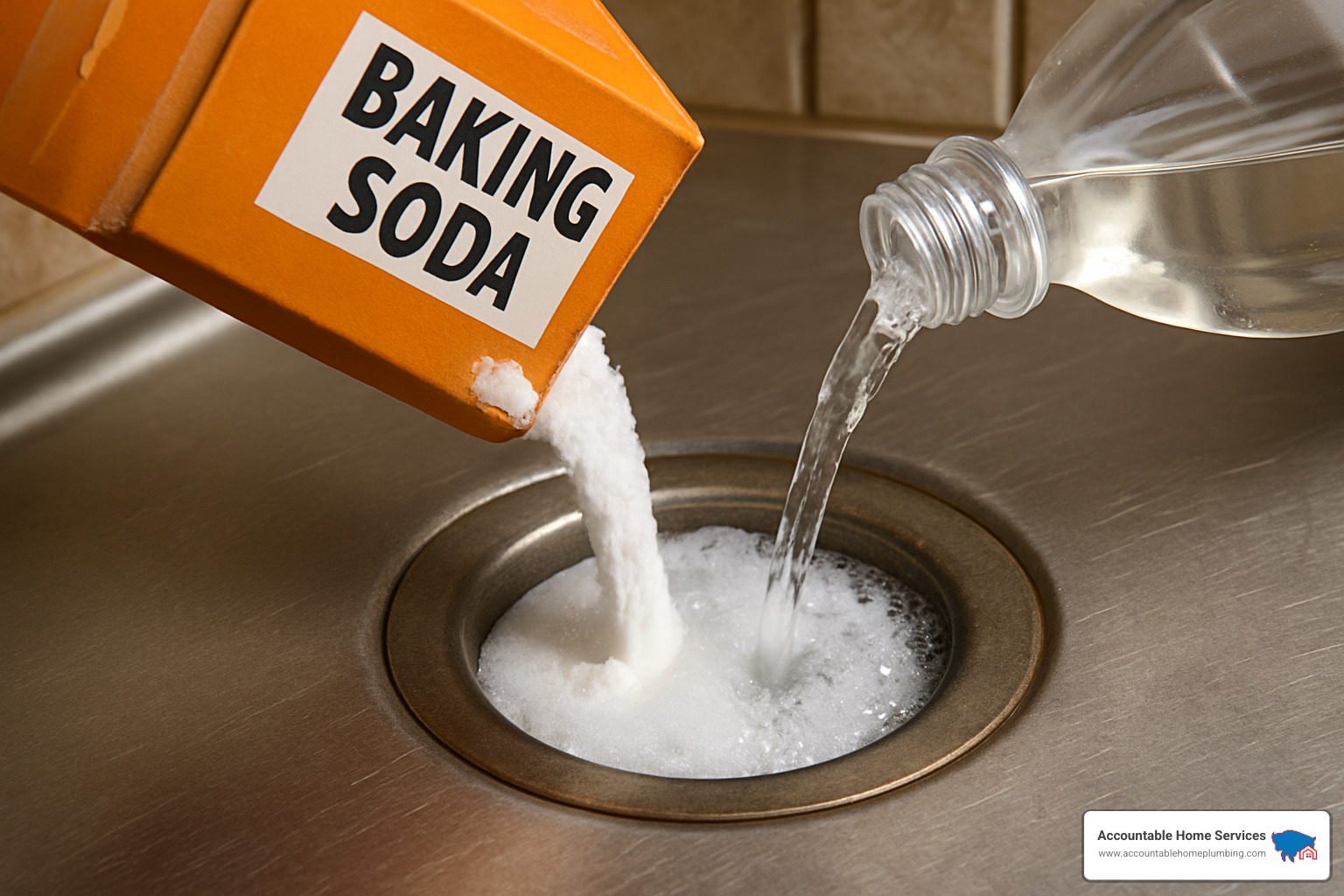
The classic baking soda and vinegar method creates a satisfying science experiment in your drain. Pour half a cup of baking soda down the drain, follow with half a cup of white vinegar, then cover the drain to contain the fizzing reaction for 15-20 minutes before flushing with hot water. The bubbling action happens because baking soda (sodium bicarbonate) is a base while vinegar (acetic acid) is an acid—when they meet, they create a reaction that helps dislodge minor debris and neutralize odors. While this method is popular, be aware of its limitations—lab tests show it's only 1-2% effective against grease.
For kitchen sink grease clogs, boiling water can work wonders. Boil a full kettle, then pour it slowly in three stages, allowing each pour to work through the clog before adding more. For improved results, add dish soap before the hot water to help break down grease. One important caution: never use boiling water with PVC pipes as it can warp or damage joints—stick to hot tap water instead.
The salt and baking soda combination offers another pantry-based solution. Mix half a cup of each, pour down the drain, let sit for 10-20 minutes, then flush with hot water (or boiling water for metal pipes). This mixture tackles minor soap scum and light grease but won't make much headway against serious blockages.
Must-Have Mechanical Tools to Pair With the Best Drain Cleaning Solution
Sometimes the most effective approach combines chemical treatments with good old-fashioned elbow grease. These physical tools can break up or remove clogs that chemicals alone can't touch.
The humble cup plunger remains one of the most effective tools for sink and shower drains. Create a tight seal over the drain, pump vigorously several times, and you'll often dislodge blockages without any chemicals at all. Almost anyone can master this beginner-friendly tool.
For toilet clogs, reach for a toilet plunger(also called a flange plunger). Position the rubber flange into the toilet trap and pump to create pressure that can resolve most toilet clogs without chemicals.
Hair clogs in bathroom drains often surrender to a plastic drain snake —those flexible plastic strips with barbs that catch hair when you feed them down the drain and twist. They're inexpensive, reusable, and surprisingly effective on shower and bathroom sink clogs.
For deeper clogs in sinks and tubs, a manual drain auger lets you feed a cable into the drain and crank the handle to break up blockages further down the pipe. This requires a bit more skill and care to avoid scratching porcelain fixtures.
When a toilet clog resists plunging, a toilet auger often saves the day. Position the curved end into the toilet trap and extend the cable to retrieve or break up whatever's causing the blockage. The protective coating prevents scratching your porcelain throne.
In my years of experience, I've found that the most effective approach is often to use a mechanical tool first to break up the clog, followed by an appropriate drain cleaner to dissolve remaining residue and clean the pipe walls. This one-two punch tackles even stubborn blockages that either method alone might miss.
For more information about professional Drain Cleaning services, our team at Accountable Home Plumbing is always ready to help when DIY methods fall short.
Professional Methods When DIY Fails
When store-bought solutions and DIY methods don't solve the problem, it's time to consider professional drain cleaning services. At Accountable Home Plumbing, we use advanced techniques that go beyond what's available to homeowners.
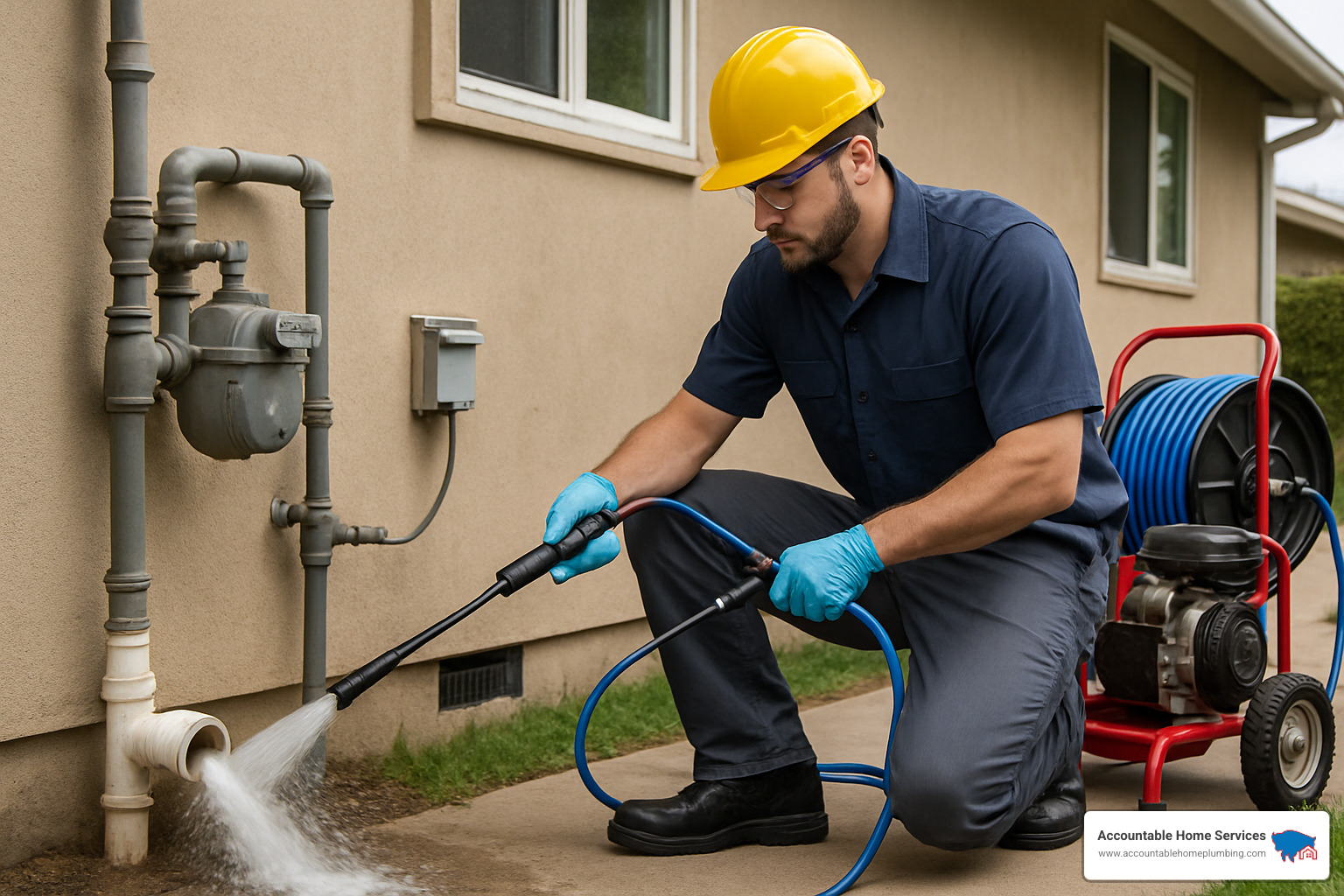
When to Reach for a Plunger or Snake Instead of a Liquid Cleaner
Let's be honest – sometimes chemicals aren't the answer. There are several situations where your trusty plunger or drain snake should be your first line of defense.
If your sink or tub is already filled with standing water, liquid cleaners will just swim around without reaching the clog. This is plunger territory! Similarly, when you're facing a completely blocked drain, most liquid cleaners simply can't penetrate deep enough to do their job properly.
Not sure what's causing your clog? Mechanical methods are safer than chemicals that might be ineffective against certain materials. And if you've already poured bottle after bottle of drain cleaner down with no results, it's definitely time to switch tactics – more chemicals won't help and could potentially damage your pipes.
For effective plunging, remember to remove the drain stopper first, then create a tight seal with your plunger. Add enough water to cover the plunger cup, then give it 5-10 vigorous plunges. Check if water drains and repeat if needed. Sometimes this simple approach is the best drain cleaning solution for a quick fix!
Hydro Jetting vs. Traditional Snaking—Which Is the Best Drain Cleaning Solution for Stubborn Sewer Lines?
When serious clogs strike, especially in main sewer lines, you've got two professional-grade options: snaking and hydro jetting.
Traditional professional snaking uses a motorized auger that we feed into your drain to break up or retrieve whatever's causing the blockage. It's generally less expensive than hydro jetting and works well for many common clogs. The limitation? It only clears a path through the blockage without cleaning the pipe walls.
Hydro jetting, on the other hand, is like power washing for your pipes. We use water pressurized up to 4000 PSI to thoroughly scour the inside of your pipes. It's particularly effective against stubborn blockages, grease buildup, and even tree roots that have infiltrated your sewer lines. While it costs more than snaking, the results are more thorough and longer-lasting.
As plumbers, we often prefer hydro jetting because it doesn't just address the immediate clog – it removes buildup from pipe walls, providing a more complete cleaning that prevents future problems. It's also more environmentally friendly than harsh chemical solutions.
At Accountable Home Plumbing, we always start with a camera inspection to check the condition of your pipes before recommending hydro jetting. This ensures the process is safe for your specific plumbing system and helps us identify exactly what we're dealing with.
Signs It's Time to Call a Licensed Plumber
While I'm all for DIY approaches, some situations clearly signal it's time to bring in the professionals.
When multiple drains throughout your home are backing up simultaneously, you're likely dealing with a main sewer line issue, not just a simple clog. Similarly, if you're battling the same stubborn clog over and over despite your best efforts, there could be underlying problems like pipe damage or tree root intrusion.
Those persistent sewer odors? They're not just unpleasant – they can indicate a broken sewer pipe or vent issue that needs professional diagnosis. And if your toilets gurgle when you use sinks or showers, your plumbing is literally trying to talk to you about a potential sewer line or vent stack problem.
Water backing up into unexpected places is another red flag. When running your washing machine causes the downstairs shower to fill with water, or flushing a toilet makes water rise in nearby fixtures, you're dealing with a main line blockage that requires professional attention.
Homes over 40 years old with original plumbing are particularly prone to system-wide issues. If your charming older home has slow drains throughout, it might be time for a professional assessment.
At Accountable Home Plumbing, we understand drain emergencies don't follow business hours. That's why we provide 24/7 emergency services throughout the Denver Metro area, including Broomfield, Westminster, Thornton, Northglenn, Arvada, Boulder, Denver, and Longmont. We pride ourselves on transparent, upfront pricing – so you'll never face surprise costs after we've completed the work.
When DIY methods have reached their limit, our team is just a phone call away with the tools, expertise, and commitment to get your drains flowing freely again. Learn more about our 24 Hour Drain Cleaning Boulder services when you need help fast.
Preventive Maintenance & Eco-Friendly Habits
The best drain cleaning solution isn't something you buy in a store—it's preventing clogs from happening in the first place. A little regular maintenance can save you from that sinking feeling when water won't go down (not to mention saving your wallet from emergency plumber visits).
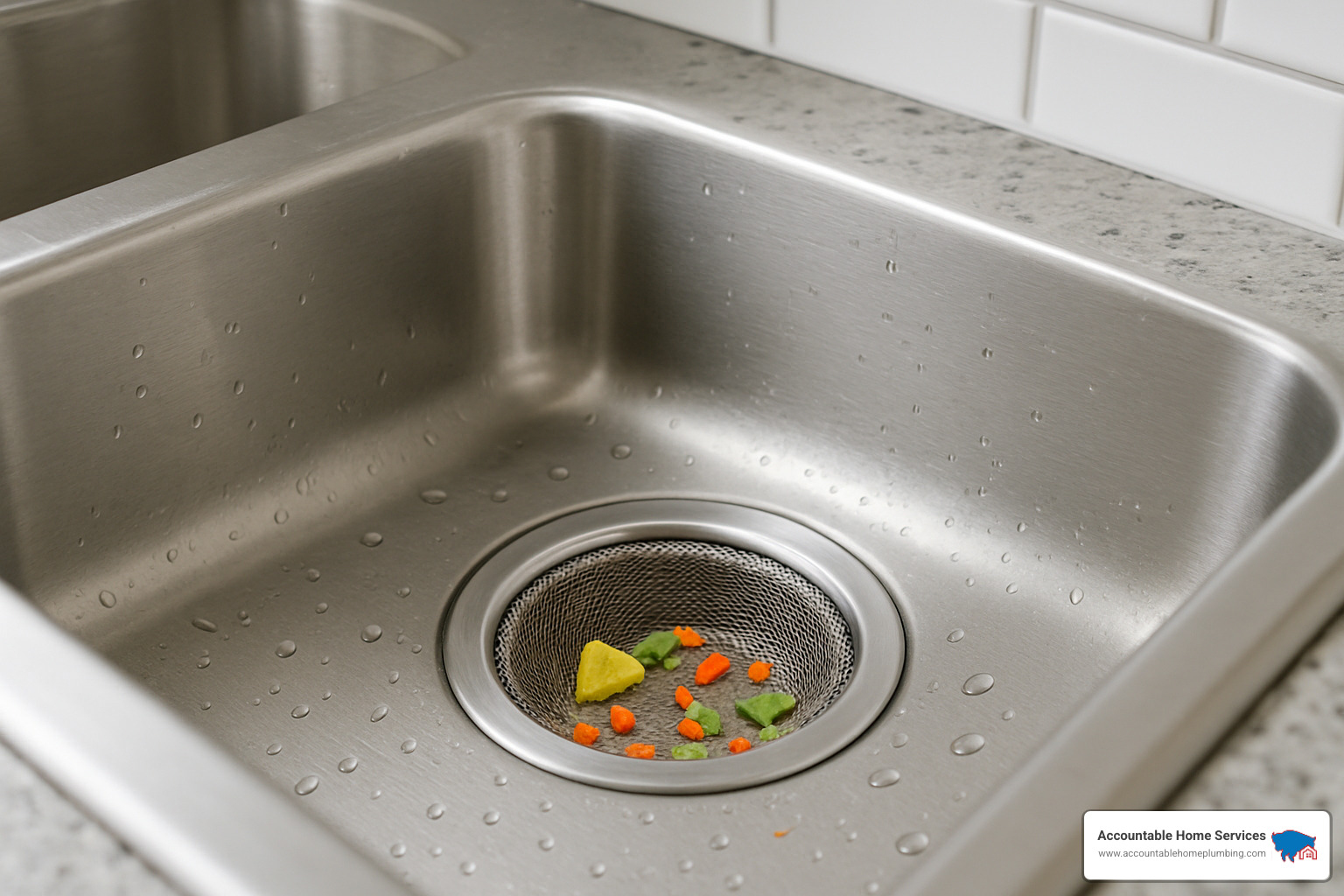
Simple Daily & Monthly Routines to Keep Drains Flowing
You know what they say—an ounce of prevention is worth a pound of cure. That's especially true when it comes to your drains.
Start by installing mesh drain screens in all your sinks and showers. These simple devices catch hair, food bits, and other potential clog-causers before they can travel down your pipes. They're inexpensive, easy to clean, and can save you hundreds in plumbing bills.
After cooking or washing dishes with grease, run hot water through your kitchen sink for about 15 seconds. This simple habit helps flush away residues before they can solidify in your pipes. And speaking of grease—never pour cooking oil or bacon fat down the drain! Instead, collect it in a container and throw it in the trash once it solidifies.
Weekly hot water flushes work wonders for keeping minor buildup at bay. Once a week, run very hot (but not boiling) water down each drain for a minute or two. This helps dissolve any developing gunk before it becomes a full-blown clog.
For monthly maintenance, I recommend using a bacterial enzyme drain cleaner, especially in your kitchen sink and shower drains. These products contain beneficial bacteria that eat away at organic matter without harming your pipes. Mark it on your calendar—the first Sunday of every month is a good time for this simple preventive step.
Don't forget about your garbage disposal! Always run cold water(not hot) when using it and for 15 seconds afterward. The cold water helps solidify any grease so it can be chopped up and flushed away rather than coating your pipes. And remember, coffee grounds, pasta, rice, and stringy vegetables like celery should never go down the disposal—they're notorious for causing clogs.
Green Choices: Septic-Safe & Environmentally Sound Practices
If you have a septic system, what you put down your drains matters even more. Harsh chemicals can kill the beneficial bacteria your septic tank needs to function properly, leading to expensive repairs.
Enzymatic cleaners are your septic system's best friend. They maintain the bacterial balance in your tank while helping clear minor clogs and buildup. Products like Bio-Clean work with your septic system rather than against it.
Be mindful about antibacterial soaps and cleaning products too—excessive use can disrupt the delicate bacterial ecosystem in your septic tank. And don't forget to schedule regular septic tank pumping every 3-5 years. It's one of those maintenance tasks that's easy to forget but crucial for preventing major backups.
Even if you're on a municipal sewer system, making environmentally friendly choices benefits everyone. When shopping for cleaning products, look for biodegradable and phosphate-free options. These break down more naturally in water treatment facilities and cause less environmental harm.
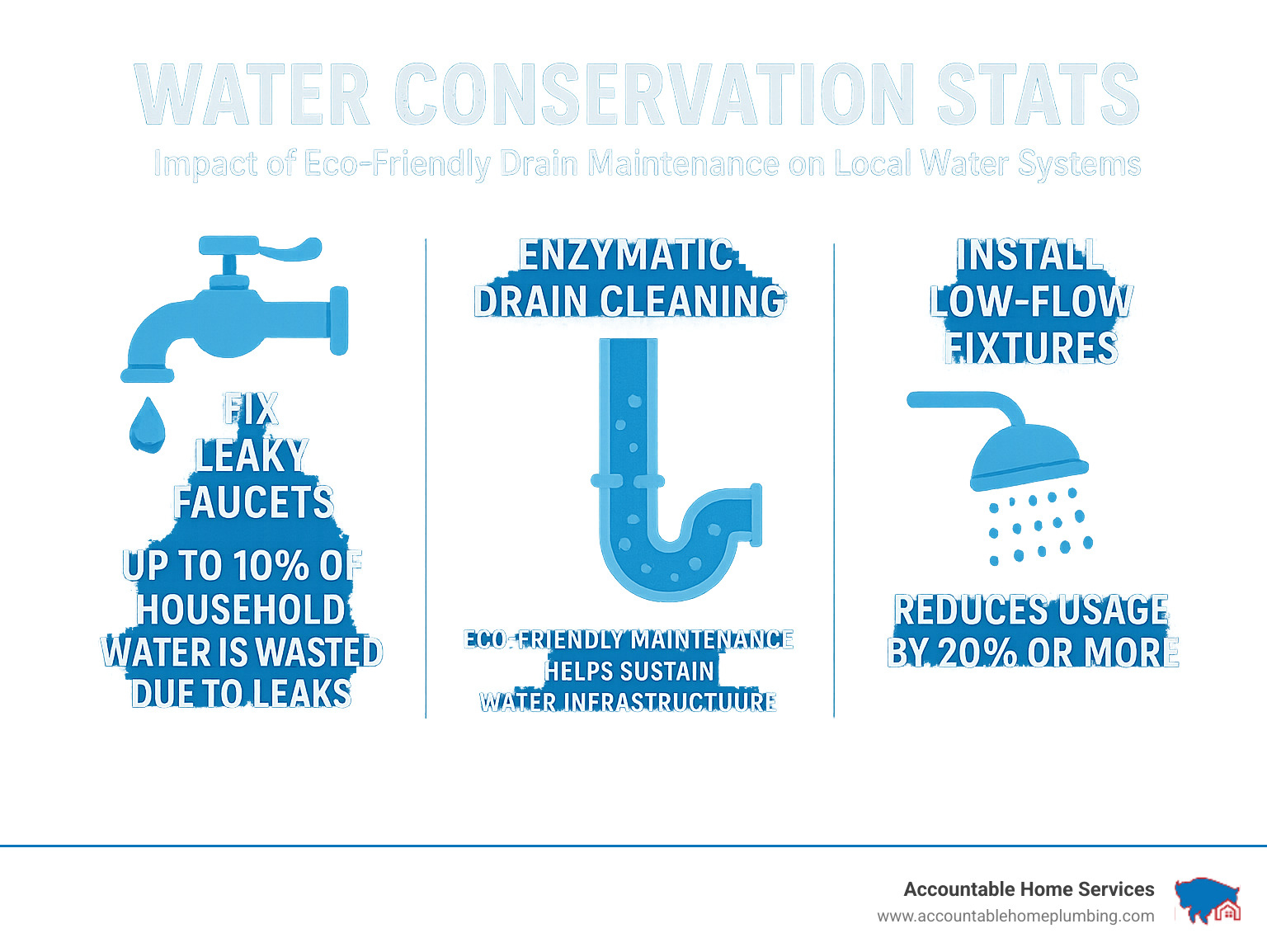
When dealing with minor clogs, reach for a plunger or drain snake before chemical solutions. These mechanical methods are often just as effective without introducing potentially harmful substances into our water system. Plus, they're reusable, making them more sustainable in the long run.
For a gentle monthly cleaning, the classic baking soda and vinegar method works wonders. Simply pour half a cup of baking soda down the drain, followed by half a cup of white vinegar. The fizzing action helps loosen minor buildup, and both ingredients are completely environmentally safe.
Don't overlook the importance of fixing leaky faucets promptly. Even small leaks can contribute to pipe corrosion over time, not to mention wasting precious water. Similarly, installing low-flow fixtures reduces water usage and decreases strain on your entire plumbing system.
By incorporating these simple practices into your routine, you'll not only keep your drains flowing freely but also contribute to healthier water systems in your community. For more detailed guidance on keeping your drains in top shape, check out our Routine Drain Maintenance page.
Frequently Asked Questions about Drain Cleaning Solutions
What is the safest product for fragile or old pipes?
If you're dealing with an older home in Denver with cast iron, clay, or galvanized steel pipes, you'll want to tread carefully. Enzymatic cleaners are your gentlest option here – products like Bio-Clean and Earth Enzymes work their magic slowly without generating heat or corrosive action that might damage those vintage pipes.
Need something with a bit more muscle? Green Gobbler Main Line Opener tends to be kinder to older plumbing than traditional chemical options, but I still recommend using it cautiously. Always follow those instructions to the letter!
Honestly, though, if your home's pushing 50+ years with the original plumbing, it might be time to give us a call at Accountable Home Plumbing. We can assess your specific situation and might recommend gentle snaking or low-pressure hydro jetting that won't stress those fragile pipes.
When should I choose mechanical tools over chemicals?
You know, I'm often asked this question during service calls, and there are definitely times when reaching for that plunger or snake makes more sense than pouring chemicals down your drain.
First off, when your drain is completely stopped up and water's just sitting there, mechanical tools should be your go-to. A good plunger creates pressure that can physically push through blockages that chemicals might just float on top of.
Not sure what's causing the clog? Mechanical methods eliminate the guesswork of choosing the right chemical formula. And if you've already tried a drain cleaner without success, it's definitely time to switch tactics rather than doubling down with more chemicals.
For toilet clogs, always start with a flange plunger – most chemical products aren't designed for toilets and can damage that porcelain or just sit ineffectively in the water.
I've also found that if you're dealing with the same drain clogging repeatedly, there's likely something structural going on that chemicals simply won't fix – could be tree roots, a collapsed pipe, or something stuck in there that needs physical removal.
Environmental concerns matter too – especially here in Colorado where we're all pretty conscious about our watershed. Mechanical methods have zero chemical impact, making them better for homes with septic systems, young children, or pets.
Are chemical drain cleaners harmful to the environment?
The simple answer is yes – most chemical drain cleaners can take a toll on our environment, which is something we take seriously at Accountable Home Plumbing.
When these harsh chemicals eventually make their way into our water system, they can harm aquatic life and potentially contaminate water supplies. This is particularly concerning in our beautiful Colorado ecosystem.
If you have a septic system, chemical cleaners are even more problematic. They can kill off the beneficial bacteria your septic tank relies on to break down waste naturally. Without those helpful microbes, your whole system can stop functioning properly.
There's also the bigger environmental picture to consider – manufacturing these chemicals often involves environmentally harmful processes, and most come in plastic containers that end up in landfills.
So what can you do instead? Enzymatic cleaners like Bio-Clean work with nature rather than against it. They use natural bacteria to digest organic matter without the harmful side effects. Your trusty plunger and drain snake have zero chemical impact, making them the most environmentally friendly options.
Prevention is really your best drain cleaning solution from an environmental perspective. Regular maintenance with hot water flushes and occasional baking soda/vinegar treatments can keep things flowing without harsh chemicals.
If you do need to use a chemical cleaner, look for biodegradable, phosphate-free options, and use just enough to get the job done. Your pipes – and our Colorado waterways – will thank you!
Conclusion
Finding the best drain cleaning solution isn't a one-size-fits-all proposition. The right choice depends on understanding what's clogging your pipes, what those pipes are made of, and striking that delicate balance between effectiveness and safety. While those chemical cleaners might offer quick relief for certain clogs, enzymatic options provide a gentler approach for regular maintenance and older plumbing systems that need a more careful touch.
If you're in the Denver Metro area and feeling defeated by a stubborn clog, we're here to help. At Accountable Home Plumbing, we've seen it all – from mysterious bathroom backups to kitchen sink disasters. Our team brings professional-grade solutions with transparent, upfront pricing and 24/7 emergency availability when DIY methods just aren't cutting it. Our experienced technicians have the advanced tools (like hydro jetting) and diagnostic equipment (camera inspections) that can tackle even the most stubborn blockages.
But here's the real secret – the most effective approach to drain care isn't about having the strongest chemicals under your sink. It's about prevention. Simply installing drain screens, being mindful about what goes down your drains, and performing those regular maintenance routines we discussed can save you from middle-of-the-night plumbing emergencies and unexpected expenses.
Whether you're in Broomfield where mineral buildup is common, Westminster with its older plumbing systems, Thornton with tree root intrusions, or anywhere else in our service area, we understand the unique challenges of Colorado plumbing. For those stubborn clogs that resist your best DIY efforts, contact our professional Drain Cleaning services for fast, reliable solutions – and never worry about hidden fees surprising you later.
Good drain health is about combining the right products with smart habits. With a little attention and care, you can keep your drains flowing freely and your household running smoothly. And on those occasions when you need a helping hand, Accountable Home Plumbing is just a phone call away – your Denver 24/7 clog-clearing experts who treat your home like our own.

